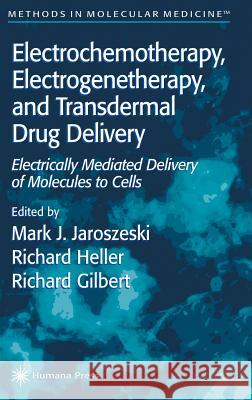Electrochemotherapy, Electrogenetherapy, and Transdermal Drug Delivery: Electrically Mediated Delivery of Molecules to Cells » książka
Electrochemotherapy, Electrogenetherapy, and Transdermal Drug Delivery: Electrically Mediated Delivery of Molecules to Cells
ISBN-13: 9780896036062 / Angielski / Twarda / 2000 / 497 str.
Electrochemotherapy, Electrogenetherapy, and Transdermal Drug Delivery: Electrically Mediated Delivery of Molecules to Cells
ISBN-13: 9780896036062 / Angielski / Twarda / 2000 / 497 str.
(netto: 777,50 VAT: 5%)
Najniższa cena z 30 dni: 578,30
ok. 16-18 dni roboczych.
Darmowa dostawa!
Pulsed electric fields have been applied to living systems in vitro for a host of delivery applications since the early 1980s. It has been established that the primary effect that electrical treatment has on cells is an induced increase in the permeability of membranes to exogenous molecules. This state of increased permeability was noted to be temporary and could be induced with little or no effect on cell viability. This physical phenomenon was termed electroporation. Numerous published studies have shown that electroporation can be applied to any cell type. These studies also exploited the phenomenon to deliver drugs, DNA, antibodies, proteins, and fluorescent molecules. The use of electricity to mediate delivery of these molecule types in vitro has proven to be an invaluable research tool for biological and biomedical scientists. Many of the in vitro applications for electrically mediated delivery have tremendous potential for the treatment of human disease. For example, the ef- cient delivery of drugs and plasmid DNA has strong implications for improving standard therapies, as well as gene therapies. This potential was realized about 12 years ago when electric pulses were used to deliver drugs to tumor cells in vivo. Since then, the utility of in vivo electroporation for the delivery of m- ecules has been demonstrated through new applications that have been developed with increasing frequency each year. Electrochemotherapy, Electrogenetherapy, and Transdermal Drug Delivery: Electrically Mediated Delivery of Molecules to Cells provides review and protocol chapters that completely cover this relatively new scientific discipline.











